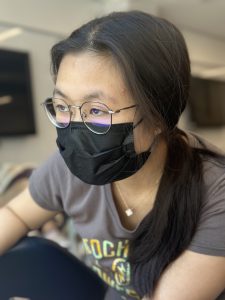
After working hard throughout the spring semester, many Hunter College students can feel burnt out when finals start. And yet, they have learned to combat those feelings and push forward.
“Burnout” is a phenomenon resulting from chronic stress that has not been adequately managed, according to the World Health Organization. The syndrome’s characteristics include exhaustion, reduced efficiency, and mental discontent. Like many other phenomena rooted in mental health, there is no universal treatment.
“For me, I have to make time for myself and my personal interests outside of academics or I’ll lose it,” said senior Sociology major Emily Chan.
According to the National College Health Assessment, 80% of college students noted feeling overwhelmed, and 40% reported it was difficult to function.
Chan said her preferred method of stress relief is crocheting, “as it gives me something inane to focus on and take my eyes off of screens for a while.”

Making time for one’s hobbies outside of work and school is highly recommended, according to the Mayo Clinic. This bypasses and treats burnout and can help with stress management.
“Honestly, I just got into it because I needed something to do with my free time that wasn’t just thinking about all the things I should be stressing about,” said Chan.
Senior Biology major Anna Boers said she tries not to leave school work until the last minute, even though sometimes it is unavoidable.
“It’s just that everything can get really overwhelming toward the end of the semester so I try to be proactive about it,” said Boers.
Boers also said that as the end of the semester approaches, she does her best to make time to see her friends especially as the weather gets better.
“I’m an extrovert so I just thrive off of other people’s presences so I make it a priority to make time for others, especially as the weather gets better,” she said.
As a student on the Pre-Med track, many of Boers’ friends are also studying something in the science field, which she considers a positive.
“They’re able to understand me in a way people who aren’t pursuing similar things don’t, so their support and encouragement really keeps me pushing even if I start to feel burnt out,” said Boers. “It’s so much easier getting through it when you feel like it’s not just you going through those feelings alone.”
Chan shared similar sentiments about having a support team around her and emphasized the importance of having a life outside of work and academics. “Don’t become a shell of yourself,” she said. “It can be difficult to make time for yourself when things get hectic, but you have to prioritize your wellbeing.”
Macaulay Honors advisor Joanna Kata said that if a student came to her about burnout, she would recommend them to Hunter’s Wellness Center. She also recommends that students take advantage of the stress relief programs hosted by Undergraduate Student Government, the Wellness Center, and the Macaulay Honors Program.
Kata also said that it’s important to maintain a schedule during hectic times to ensure students can get what they need done without overwhelming themselves.
“Also, talking to friends and family can be so helpful,” said Kata. “Sometimes just talking things through can help students from spiraling.”
